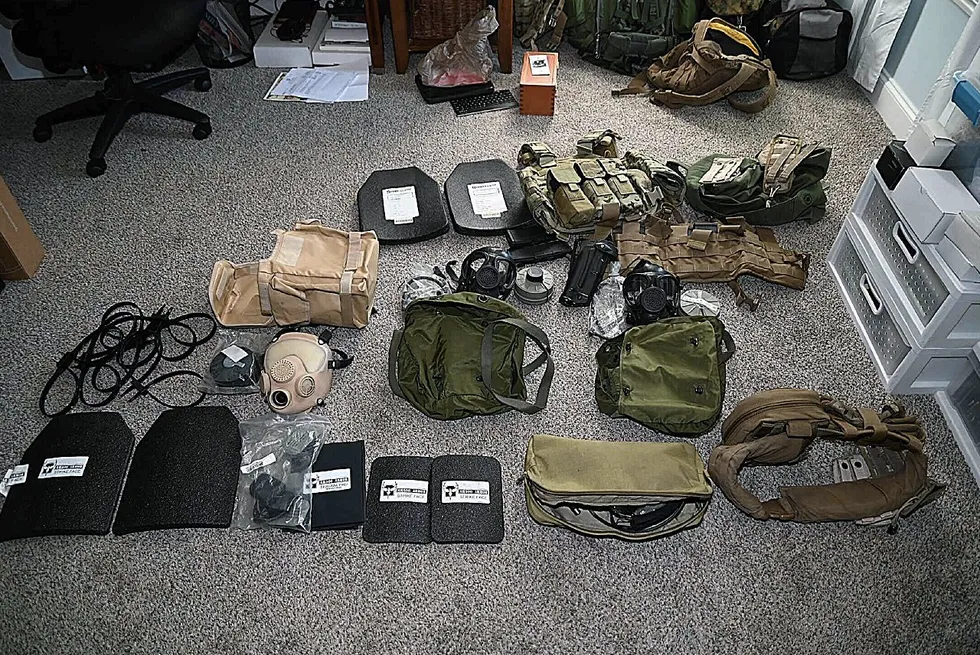Former Jan. 6 defendant gets life sentence for plot to kill FBI agents, other law enforcement

Edward Kelley, one of the last Jan. 6 defendants still behind bars after his case was dismissed under President Donald J. Trump, was handed a life sentence in federal court Wednesday for plotting to kill federal, state, and local law enforcement officers in Eastern Tennessee.
Kelley, 36, of Maryville, Tenn., was given a life prison term by U.S. District Judge Thomas Varlan on a charge of conspiracy to murder employees of the United States. Kelley was given 240 months for solicitation to commit a crime of violence and 120 months for influencing federal officials by threat.
'Every hit has to hurt.’
A federal jury found Kelley guilty on those counts on Nov. 20, 2024. Kelley argued that the Jan. 6 pardon declaration issued by President Trump on Jan. 20 should cover the Tennessee charges. The DOJ and Judge Varlan disagreed, setting the stage for Kelley’s sentencing.
On Jan. 22, the Jan. 6 case against Kelley was dismissed on a motion from the Trump Department of Justice. Kelley was found guilty in a bench trial of 11 criminal counts ranging from obstructing officers during a civil disorder and destruction of government property to engaging in physical violence in a restricted building or grounds and entering and remaining in a Capitol gallery.
Because Kelley had not yet been sentenced by U.S. District Judge Colleen Kollar-Kotelly on the Jan. 6 charges, his case was dismissed based on President Trump’s pardon declaration.
RELATED: J6 defendant who plotted to kill FBI agents should not be released by presidential pardon, DOJ says
 Weapons that Edward R. Kelley planned to use in his plot to kill federal, state, and local law enforcement, according to prosecutors.U.S. Department of Justice
Weapons that Edward R. Kelley planned to use in his plot to kill federal, state, and local law enforcement, according to prosecutors.U.S. Department of Justice
In the other case, Kelley “devised a plan to murder federal, state, and local law enforcement personnel in East Tennessee,” which “included attacking the FBI office in Knoxville with various iterations of improvised explosive devices,” according to the DOJ sentencing memo.
Prosecutors said Kelley was “motivated by a desire to initiate a civil war and retaliate for his previous arrest.” He discussed his plans with two other men on an encrypted message platform and during in-person meetings in November and December 2022, prosecutors said.
The plans included “use of improvised explosive devices inside of vehicles and incendiary devices attached to drones,” the DOJ memo said. Kelley told the men he had a hit list, discussed “conducting assassination missions,” and in particular wanted to target “that b**ch Mann,” a reference to FBI Special Agent Jessi Mann, prosecutors wrote.
“The Defendant did not simply talk about his plan,” the DOJ said. “The evidence in the case is replete with examples of the defendant taking action to implement his planned attack on East Tennessee law enforcement.”
Kelley conducted close-quarters battle training, identified rally points, and directed the execution of his plan to attack the FBI office in Knoxville should he be arrested, prosecutors wrote.
 Supplies that prosecutors said Edward R. Kelley planned to use in his plot to kill FBI agents and other law enforcement officials in Eastern Tennessee.U.S. Department of Justice
Supplies that prosecutors said Edward R. Kelley planned to use in his plot to kill FBI agents and other law enforcement officials in Eastern Tennessee.U.S. Department of Justice
“You don’t have time to train or coordinate, but every hit has to hurt. Every hit has to hurt,” the DOJ quoted Kelley as saying.
Kelley identified 36 federal, state, and local law-enforcement personnel targeted for assassination, based in part on their role in a May 2022 search of his home and his arrest on Jan. 6 charges.
He was arrested by the FBI on May 5, 2022, on initial charges of assault, obstruction of law enforcement, destruction of government property, unlawful entry, and violent entry at the U.S. Capitol. The official who signed the criminal complaint dated May 3, 2022, was Special Agent Mann.
In Kelley’s sentencing memorandum, defense attorney Mark E. Brown downplayed the threat Kelley posed.
“Although Kelley has been convicted of serious offenses, no individual was directly threatened with harm or violence by Kelley, and no one was injured,” Brown wrote. “Kelley does not deserve the same sentence as an actual ‘terrorist’ who injured or killed hundreds or thousands of America [sic] citizens.”
Judge Varlan ruled that Kelley will remain in custody while he awaits assignment to a federal Bureau of Prisons facility.
Like Blaze News? Bypass the censors, sign up for our newsletters, and get stories like this direct to your inbox. Sign up here!